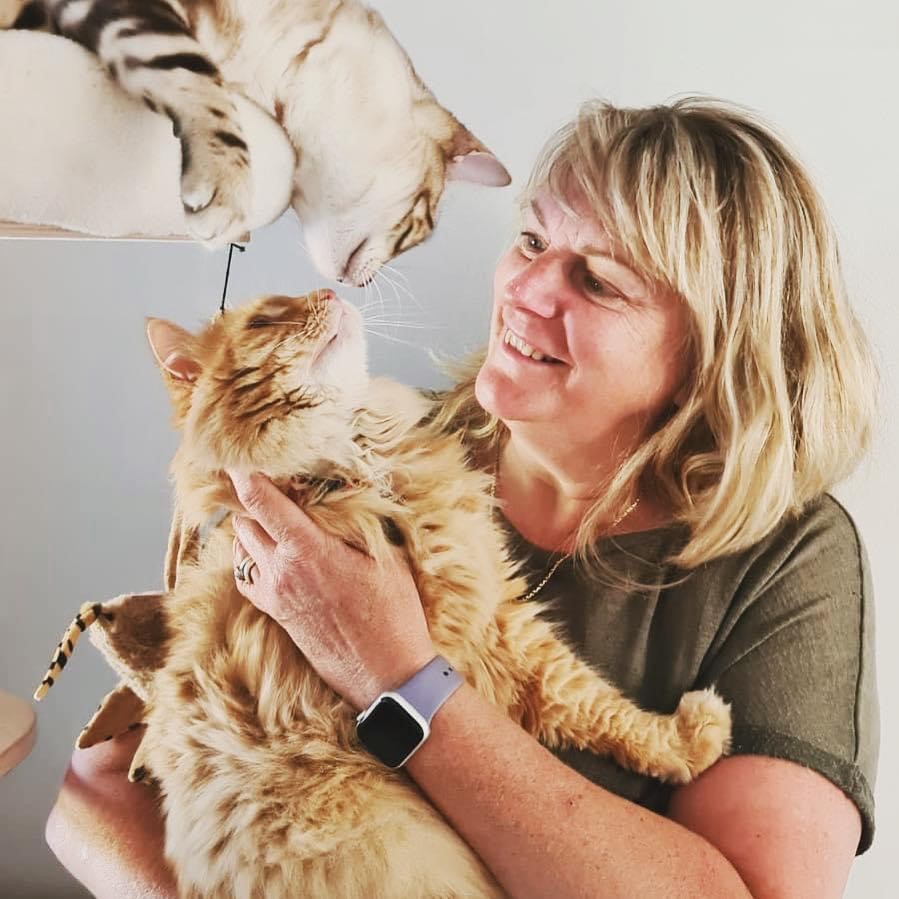Pheromone Support for Geriatric Cats
Managing Confusion and Anxiety in Aging Felines
As our feline companions age, they may face a range of challenges that affect their physical as well as their emotional well-being. One of the most common issues observed in senior cats is a decline in cognitive function, often referred to as feline cognitive dysfunction syndrome (CDS). This condition can lead to confusion, disorientation, and anxiety, making it difficult for older cats to navigate their environment and daily routines with the same confidence they once had.
In this article, we will explore the impact of cognitive decline on geriatric cats, the signs of confusion and anxiety to look out for, and how synthetic pheromone support, such as products offered by Comfort Zone, can play a crucial role in helping your ageing cat feel more comfortable and secure.
Understanding Cognitive Decline in Senior Cats
Cognitive decline in cats is similar to dementia or Alzheimer’s disease in humans. As cats age, changes in the brain can lead to a decrease in cognitive abilities, affecting memory, learning, and awareness. This decline is a natural part of the ageing process, but it can be distressing for both cats and their care givers.
Signs of Cognitive Dysfunction in Cats
Recognising the signs of cognitive dysfunction in your senior cat is the first step towards providing them with the support they need. Some common indicators of cognitive decline include:
1. Disorientation: Your cat may appear confused in familiar surroundings, they may get lost in your home or their wider outdoor territory. They may also wander without any purpose and may forget the location of their litter box or food, water bowl and other resources.
2. Changes in Sleep-Wake Cycles: Cats with cognitive decline may exhibit altered sleep patterns, sleeping more during the day and becoming restless and vocalising excessively at night.
3. Increased Vocalisation: As cognitive function declines, cats may meow more frequently, often in a distressed or confused tone, particularly at night when they are alone.
4. Litter Box Issues: A cat with cognitive dysfunction may forget where their litter box is located or may stop using it altogether, leading to inappropriate elimination. (this may also occur due to arthritis)
5. Decreased Interaction: Your cat may seem less interested in interacting with you or other pets, appearing withdrawn or even aggressive in situations where they were previously affectionate or sociable.
6. Anxiety and Restlessness: As cognitive function deteriorates, cats may become increasingly anxious and restless. They may pace, hide, or display other signs of distress.
The Role of Pheromone Support in Managing Cognitive Decline
One of the most effective ways to help manage the symptoms of cognitive decline in geriatric cats is through the use of synthetic pheromones. Pheromones are natural chemicals that animals use to communicate with each other, and synthetic versions can mimic these natural signals to create a calming effect in cats. Products like Comfort Zone’s Pheromone Diffusers can be particularly beneficial for ageing cats experiencing confusion and anxiety due to cognitive decline.
How Pheromones Help Geriatric Cats
As cognitive functions decline, older cats may feel increasingly insecure in their environment. The use of synthetic pheromones can help mitigate these feelings by:
1. Promoting a Sense of Security: Pheromone diffusers release a synthetic version of a combination of a number of the feline facial pheromones, which cats naturally produce when they rub their faces against surfaces to mark them as safe, this is called allomarking. By filling your home with these calming signals, you can help your cat feel more secure, reducing their anxiety and stress.
2. Supporting Routine and Familiarity: Senior cats thrive on routine, and any disruption can exacerbate their confusion. Using pheromone products in areas where your cat spends most of their time can create a consistent, comforting environment that helps them navigate their daily routines with less stress.
3. Reducing Night-time Anxiety: Many cats with cognitive dysfunction experience increased anxiety at night. This can be due to the changes in their sleep-wake cycles or the disorientation that worsens in the dark. Plugging in a Comfort Zone Pheromone Diffuser in your cat’s sleeping area can help soothe them during these restless periods, potentially reducing night-time vocalisation and pacing.
4. Easing Transitions and Changes: Even small changes in the home environment can be distressing for an ageing cat. Whether it’s rearranging furniture or introducing new items, these subtle changes can increase anxiety in a cat with cognitive decline. Using pheromone diffusers can help ease these transitions by maintaining a familiar and reassuring atmosphere.
Practical Tips for Supporting Your Geriatric Cat
In addition to using pheromone support, there are several other strategies you can implement to help your ageing cat cope with cognitive decline:
1. Maintain a Consistent Routine: Try to keep feeding times, play sessions, and other daily activities as consistent as possible and age-specific for their abilities. This predictability can help your cat feel more in control and reduce their anxiety.
2. Provide Mental and Physical Stimulation: Engaging your cat in gentle play and mental exercises can help slow the progression of cognitive decline. Puzzle feeders, interactive toys, and safe spaces to explore can keep your cat’s mind active. Using a beneficial supplement high in omega 3 can also help brain function.
3. Create a Safe and Accessible Environment: Make sure your home is easy for your senior cat to navigate. Keep essential items like food, water, and litter boxes in easily accessible locations. Consider providing multiple uncovered litter boxes with low entry points and ensuring that your cat can reach their favourite resting spots without difficulty. There are even special steps and ramps available to assist your cat reach these places with ease.
4. Offer Comforting Scents: In addition to using pheromone diffusers, consider placing items with your scent in your cat’s sleeping areas. Cats find their owner’s scent reassuring, and this can provide an additional layer of comfort.
5. Regular Vet Check-Ups: Cognitive decline can sometimes be exacerbated by other health issues. Regular veterinary visits at least every six months as our senior cat enters their super senior life stage can help identify and manage any underlying conditions, thus ensuring your cat remains as healthy and comfortable as possible.
The Benefits of Comfort Zone Pheromone Diffusers
Comfort Zone Pheromone Diffusers are an excellent tool for pet parents looking to support their aging cats through cognitive decline. Easy to use and highly effective, these diffusers can provide continuous, calming pheromone support throughout your home. By mimicking the natural signals that cats associate with safety and security, Comfort Zone products can help reduce anxiety and improve the quality of life for your geriatric cat.
Simply plug the diffuser into an outlet in a room where your cat spends most of their time, making sure it is at cat nose height and not near any fragrance diffusers and letting it work to create a more relaxed environment. The diffusers are odourless to the human sense of smell and provide a non-invasive way to support your cat’s emotional well-being as they age.
Conclusion
Caring for a geriatric cat with cognitive decline can be challenging, but with the right strategies and tools, you can help your cat navigate this stage of life with greater comfort and less anxiety. Pheromone support Diffusers, offer a simple yet effective way to create a calming environment for your senior cat, helping them feel more secure and reducing the stress associated with cognitive dysfunction.
By combining pheromone therapy with a consistent routine, mental and physical stimulation, and a supportive home environment, you can make a significant difference in your cat’s well-being. With patience, love, and the right care, your ageing feline companion can continue to enjoy a happy and peaceful life, even as they face the challenges of cognitive decline.

Amanda Campion
Clinical Feline Behaviourist CAB APBC ABTC

